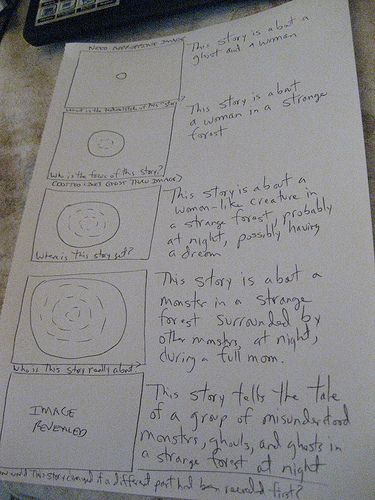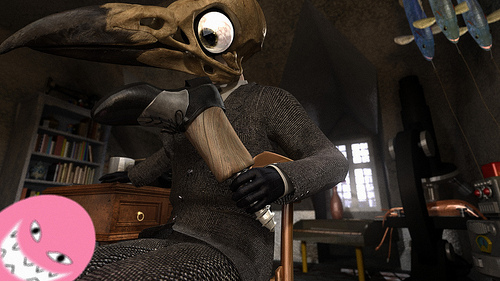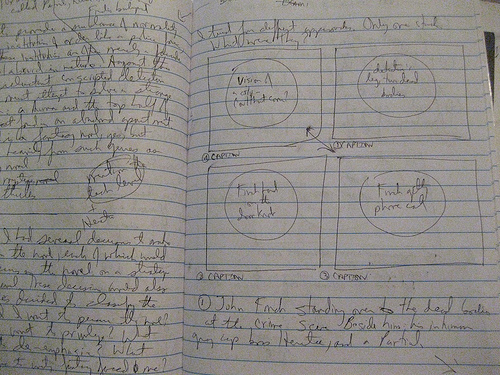Jeff Vandermeer's Blog, page 45
September 22, 2011
Wonderbook and Other Updates–And Your Creative Writing Questions
I have a deadline to turn in a chapter of the creative writing book I'm working on, working title Wonderbook, by early next week, which has me a little behind on blogging. Above you'll see one of the rough sketches I've done for the book. It's meaningless without the context, but in a nutshell it's a visual dramatization of a creative writing concept. The book will have over 150 full-color images, and in writing it I'll also be working with designer John Coulthart to come up with an effective visual language for teaching creative writing.
I'll post more on the Mormeck serial next week as well—the next scene is one of those pivot points I really need to work hard on to get right so I'm not spending a lot of time revising later. After that, I should be posting more regularly on Mormeck.
In other news, Cheeky Frawg is getting ready to release both Amal El-Mohtar's The Honey Month in e-book format and the anthology ODD?—the latter features a short film by Gregory Bossert with music by Danny Fontaine from lyrics I wrote and then Danny revised. Still image below.
Although I'm going to be busy the next few days, I will stop by here a bit. So…if you have any questions about creative writing, ask and I will attempt to answer. Since I'm immersed in writing about the subject at the moment anyway….
Wonderbook and Other Updates–And Your Creative Writing Questions originally appeared on Ecstatic Days on September 22, 2011.
September 19, 2011
The Journals of Doctor Mormeck's Avatar–Entry #14
Note: Been reading this serialized long story/novella? Please support a full-time writer. Paypal to vanderworld at hotmail.com—much appreciated! Donations above $21 will entitle you to a free copy of initial anthology or stand-alone book appearance.
Living on a far-distant planet, Doctor Mormeck works for strange beings that might or might not be angels by conducting surveillance across a hundred thousand alt-Earths. Complicating things are a transdimensional race of intelligent komodos wreaking chaos throughout the worlds. When an avatar of Mormeck is sent to a war-torn winter city to investigate a mysterious Presence, the doctor will become embroiled an ever-widening conflict.
Archive is here, Journals of Mormeck, and first entry is here. The full-on 34,000 words before this entry is compiled in one place, here.
Warily, I returned to Pavlov's House—the fortified building controlled by Sergeant Yakov Fedotovich Pavlov of the Trotsky-Soviet army. I was much different, of course, even though the avatar that manifested after I ghosted my way stealthily through the defenses, through a door, and then scuttled tiny along the walls of corridors to his office was the same Pavlov had always seen. More of Mormeck Mountain had been flensed away. Less of the giant komodo I came to him as was komodo-ish. And I had a speck of an alien civilization hidden in my body.
As I had avoided pitched battles between German and Soviet tanks in already blasted streets, buildings gutted, smoldering hulks, I had had—in the crisp, cold air, with the blue of the sky a kind of bright smile commenting on the limits of human absurdity—a sort-of epiphany: that I was finally becoming myself, and that I did not yet know what that might mean. I still had my mission, which was now to find my way back to Mormeck Mountain, but at the frontiers of my mind, I could sense outliers of doubt, of lack of purpose, and nothing to replace it.
But whatever it meant, I knew I had to get out of the city, and while I could do that blind, and could flee to any corner of the world, disregarding the intel from the Speck of the Remnant in my body, I preferred to travel to the Far East. A vastness of time and landscape awaited me before my self-rescue, but somehow I needed that. A century was more than enough time to find myself.
Pavlov didn't seem surprised to see me even though several months had passed, but, then, I had never seen him express surprise over anything. He had perfected the art of receiving information with a stoicism that, while learned, gave him the upper hand in most situations.
But I was surprised to see that standing beside him were Uri and Aleksei, the two soldiers I had saved from the threat of the Remnant outside of their strange domed building. Both of them looked astonished to see their reptilian benefactor again, and not in a good way. They reached for their weapons, but Pavlov barked an order form them to stand down. They did so almost with relief, as if their action had been reflexive and they had no real stomach for the task.
"Body guards?" I asked.
"I am their body guards," Pavlov said, "after what they saw."
"The impossible is real?"
"And maybe that, too," Pavlov said. His face seemed more worn but less wrinkled, as if he had been worn smooth like a stone by the extremity of his situation. His hands showed evidence of thwarted frostbite. He had lost some hair and some had turned gray. From under the table he sat at, I could see his boots were in tatters, bound in cloth. I knew from the history I had seen that the past two months had been the worst of the war for Pavlov's unit. He could have used a huge, invisible komodo during those dark days. But I had not been there. Though I owed him nothing, really, an odd guilt twisted inside of me.
"It's good to see you." And it was. A familiar face, someone I instinctually trusted even though I shouldn't have trusted anyone.
"It's an unexpected pleasure," Pavlov said, with what might have been irony. Uri and Aleksei had unfrozen from their positions against the far wall and Pavlov motioned to them. "Go get tea." Neither of them moved.
"Tea?"
Pavlov gave a weary smile. "All my vodka goes to the men, along with the local rotgut they make and put in used milk bottles. Now!" And in the strain in his voice ordering his men I saw further evidence of his fatigue.
Neither soldier seemed happy to have to edge by me and out the door, but they did it rather than face Pavlov. I could hear them running down the hall.
"Are they bringing more soldiers?" I asked.
Pavlov grinned. "No. Just tea," he said with disappointment, either feigned or real. "Only tea. But I am inappropriately curious: what happened to you?"
I thought about answering him. It was a simple question, but one with a complicated answer. What would be gained by giving Pavlov more of a glimpse into the truth of other worlds? Would it assuage his curiosity or simply enflame it? Would it leave him with the nagging sense he had missed something, for as long as he lived?
"I ran into…complications. I almost died. But nothing that happened has any bearing on your situation."
Pavlov nodded, but said, "Except that you are here again." His head held at an angle, as if spurring me on: "Complications, and…?"
"As a result, I need to leave the city. I need to head to the Far East. I need to find sanctuary there for a long, long time."
Uri and Aleksei came back nervously with the tea then, although they seemed to have regained some semblance of control. They shut the door quickly behind them, and Pavlov took over the ritual of preparing the tea, setting out the cups on the table cloth. His hands shook a little bit. I knew he survived this war, I knew he lived a long life after, but it still bothered me to see that.
"I know some people in the Far East," Pavlov said after a pause. "My family isn't from there, but friends of the family are. More specifically, I know of a place that you can stay and no one should bother you…so long as you…" He looked me up and down. "You are rather distinctive."
"I won't travel in this form."
"Of course you won't." But it was clear from the unexpected scintilla of surprise in his voice that it had not occurred to him that I might manifest as anything as other than a small or large komodo.
He wrote an address on a piece of paper. "The owner of this cottage is missing, presumed dead…It is a lawless place. The Chinese and the Japanese do not respect the border. You may find yourself in another war zone." Then he stopped writing, looked up at me, scribbled more words. "And this is a postal box where you can reach me now…or after the war."
I could see it in his eyes: Pavlov wouldn't risk giving me his home address, couldn't know I already had it from the files—wife, three children, Moscow—but he was willing to risk further contact.
"Thank you, Pavlov."
I'm not sure I can explain how that gesture made me feel. It meant something to me, something that took me yet further away from Mormeck Mountain. I had a sudden image of a graying, elderly komodo—monstrous—clothed in a sweater sitting in a rocking chair in a far-distant cottage and penning a letter to his old comrade from the war. Maybe one day coming to visit, catching up their separate lives.
Absurd. Impossible. Or was it?
As I took the piece of paper as gently as I could from Pavlov, my massive claws clicking together, I felt a welling up of affection I had not expected, mixed with an utterly devastating sadness. In this forsaken place, sent here by demons disguised as angels.
Pavlov was the closest thing I had ever had to a friend. And I was leaving him now. For his own safety as for mine.
"In return, there is one thing I would like you to do for me on your…on your way out of town," Pavlov said.
"Anything, Pavlov," I said.
I could hear the Scrap inside me vibrating minutely with laughter, and that struck me as sinister…
for hm
The Journals of Doctor Mormeck's Avatar–Entry #14 originally appeared on Ecstatic Days on September 19, 2011.




September 18, 2011
Writers: What's the Stupidest Story Idea You Ever Had?
This one is just for fun…and to show readers just how many bullets they may have dodged…
What's the stupidest story idea you ever came up with? Or the stupidest story you wrote, possibly without at first realizing it was stupid? (And if so, how did you find out it was stupid? Did someone have to tell you?)
My stupidest story is probably one in which FBI agents afraid of wiretaps communicate via a secret language composed of farts…I also once wrote a poem that was an ode to my beard. In my defense…I was fairly young.
Now it's your turn…
Writers: What's the Stupidest Story Idea You Ever Had? originally appeared on Ecstatic Days on September 18, 2011.
Books with Soundtracks, Murder by Death…and "Augmented" Books
[image error]
The writer of this Atlantic.com article interviewed me about books and soundtracks, since all three of my Ambergris novels come with soundtracks: Robert Devereux's Fungicide (for City of Saints), The Church's Shriek: An Afterword, and Murder by Death's Finch. (I have copies of the MBD soundtrack for sale.)
The reporter couldn't use everything I gave her, of course, especially as the article is mostly about Booktracks, a company that provides "book scores" for your listening pleasure—something I'm a little dubious about. So I've taken my full answers and posted them below.
[image error]
On the Finch soundtrack, listening to music while writing, and augmented books…
I'd had soundtracks for the two previous novels in the series–Robert Devereux's experimental "Fungicide" CD for my City of Saints & Madmen mosaic novel and then the classic Australian rock-pop band The Church did a CD of original music for my second novel, Shriek: An Afterword. So in one sense, I kind of had to complete the cycle by having a soundtrack for the third book.
But all three of these experiences were very different. In Devereux's case, he had already created music before he approached me and then I just gave him permission to use story excerpts and contributed a spoken word part as well. With The Church, I directly commissioned them since I was doing a short film based on the book and needed first a soundtrack for that…which then became a soundtrack for the novel, of course. (I must say, one of the great experiences of my life, being a huge Church fan, was meeting them all in Australia before they agreed to do the project.)
For the Murder by Death CD, it came about a little differently. I'd been listening to their music while I wrote the novel, and then I approached them with an advance reader copy asking if they'd be willing to do a soundtrack if we could work out the details. They liked the novel a lot, liked the idea, and so I was able to work out a deal with my publisher to have the publisher initially finance the soundtrack. Basically what they did is, even though they were offering a normal trade edition to bookstores, etc., they also did a limited edition that came with the CD, and sales from the limited paid Murder by Death. And then Murder by Death was free to also sell it to their fans, in vinyl and CD versions. Also streaming it over the internet, of course.
With Murder by Death, I love their music so much I just basically said as far as I'm concerned you're free to do whatever you like, and I think I just pointed out that there is a band playing in one scene in the novel. Finch as a novel is something of a chimera. It's meant to have visionary and phantasmogorical effects within the context of playing with the tropes of noir and literary fantasy. So the music had to be kind of noirish, and have an edge, but also be able to have a kind of surreal beauty to it, which I thought was something that glimmers through on Murder by Death's music, even if it's not acknowledged as much as it should be.
They then kind of conceptualized it like a movie soundtrack. So that the main character, John Finch, has his own theme music, and his nemesis does as well. There's a scene that's a little William Burrough-esque where he's experiencing a dead man's memories accessed by basically eating a mushroom, and they gave that scene it's own music. A kind of Reservoir Dogs scene with several different groups getting caught up in a gun battle they did a three-part song for that's the prelude, the event itself, and a kind of aftermath. They also did something really cool and they read the scene with the makeshift band in it and they created a song using only the instruments mentioned in the novel, including a trash can lid! And it sounds great. In fact, it sounds so much like what I thought the band in the novel would sound like that it's incredible. Perhaps, of course, because I was listening to Murder by Death when I wrote that scene, but still…
What they've managed to do for the most part is create something that texturally matches the style of the novel in such a way that even though it references specific scenes, the soundtrack serves both purposes. Readers have reported playing it in a continuous loop in the background or playiing the specific tracks at the point where they're reading those specific scenes. That might not have been the case if the band hadn't obviously thought really hard about creating a cohesive experience across tracks even as they tried to capture those particular moments that most captured their imaginations.
I'm not sure I would use something like Booktracks, which sounds a bit like it's riffing off of the more dramatic audiobooks. As someone who loves reading and music, I like to find organic, unexpected confluences between certain bands and musicians I like and certain books, where the synergy is really about something similar or in conversation between imaginations. For example, The Church were a good fit because they read a lot of really great SF and fantasy–and that translates into their songs. They have quite a few songs that have that element. Indeed, when I met them on the beach one of them was reading The Master and Margarita.
I also don't want a soundtrack for some books, or sometimes when I'm writing. The great thing about music when you're writing is it's so direct into your brain that it also tends to overwhelm the critical element, the bit where you sometimes have difficulty getting into the fictive dream and are standing outside of it too much and editing. So music is an aide there. And it can be very, very powerful when reading. There's an album by Robbers on the High Street that I listened to while reading Philip Pullman's Golden Compass series, and I would never have thought that album went with those books, but…something about the music was evocative of cold and snow and winter, and it just fit so perfectly that it enhanced the experience and I can't listen to that music now without thinking of scenes from the book. On the other hand, I read Graham Joyce's amazing novel The Silent Land earlier this year and I had to have total silence for that book. The style of the book, the way it envelops you, you can't have anything playing the background. The book is about stillness in some ways, and about the significance of silence, and it doesn't work with anything on in the background.
But I provided that myself—silence or not-silence, and chose the full context. I made those connections on my own, and I think that might be the most important element here. When we read it's a two-transaction and the reader's imagination is supplying something, meeting the writer in the middle, if the writer is smart enough to leave space for the reader. And the same has to hold true for music in the context of reading.
Books with Soundtracks, Murder by Death…and "Augmented" Books originally appeared on Ecstatic Days on September 18, 2011.
September 17, 2011
Crowdsourcing: Cliches in SF, Fantasy, and Horror: Plots, Characters, Situations
For my creative writing book for Abrams Image—a definitive illustrated guide to writing speculative fiction—I'd like a running column in one of the chapters of cliches. I can't possibly list them all, so if you'd like the chance to contribute an attributed entry, please comment here. A couple of sentences describing the cliche followed by dash and your full name. In other words:
A man in a bar meets a mysterious woman. They go back to her place. She turns out to be a werewolf/vampire/serial killer. — Jeff VanderMeer
Yes, there are lists out there and I have my own list, but this is more fun.
Thanks! I'll take them through this upcoming Thursday.
Crowdsourcing: Cliches in SF, Fantasy, and Horror: Plots, Characters, Situations originally appeared on Ecstatic Days on September 17, 2011.




September 16, 2011
Evil Monkey's New Religion–What Should Evil Tackle Next?
I'm in full-on inspiration mode on the writing book, so no time to blog today…so instead, a repost of the last Evil Monkey, and, for the first time, a question for the audience: What would you like to see Evil and alt-Jeff talk about next? You can post your reply anonymously. I don't care.
Evil Monkey:
I'm starting a new ideology.
Jeff:
Based on what tenets?
Evil Monkey:
Everyone is evil. Everyone is a monkey.
Jeff:
Even aarkvarks?
Evil Monkey:
Even aarkvarks.
Jeff:
Don't do it, dude. Ideologies are toxic.
Evil Monkey:
No they're not—they're the life's blood of social change.
Jeff:
Until they go rogue.
Evil Monkey:
You live under the constraints of a rogue ideology—capitalism.
Jeff:
Capitalism is like the morphine of ideologies. You're going to become so addicted you're going to die, but everything will be so fuzzy around the edges you'll almost enjoy it, if you're selfish enough.
Evil Monkey:
Like a cocoon protecting you from the irrational insanity of your brain.
Jeff:
Um, not exactly. Okay, maybe that's it exactly.
Evil Monkey:
My ideology will be pure, though. It'll only do good. It's been created to do good.
Jeff:
They all start out that way. Most of them. Some of them. Then before you know it you're being pushed forward to defend the Volga by political officers who will later report your every nervous tic to a homicidal dictator and after the war you will probably be sent to die in a work camp despite the medals of valor on your chest.
Evil Monkey:
You're cynical.
Jeff:
No, just brushing up on the Siege of Stalingrad. Do you know even the starlings were converted to an ideology? They converted to the ideology of the Germans. They began to sound like the sound of mortar fire. Mimicry—a key component of ideology. You must have insurgents.
Evil Monkey:
You're not helping. I need some key terms to promote my ideology. Jargon that distinguishes my ideology from others.
Jeff:
What's your ideology?
Evil Monkey:
Everyone should do good deeds and anyone who doesn't do good deeds should be shot. And animals are pets, not meat. Meat should be liberated from its prisons. Wait—I wrote that last bit down wrong. It should've read "Meat is liberal and must be protected."
Jeff:
Are you some kind of mutant Franciscan?
Evil Monkey:
So I thought my terms would be "gooder", "anti-gooder", and "angel."
Jeff:
And am I going to regret asking what those mean?
Evil Monkey:
A "gooder" is someone who is doing good deeds. An "anti-gooder" is someone who is sitting quietly in their house taking up space not doing good deeds. An "angel" is someone who is intrinsically imbued with "gooder" qualities. In other words, even when that person is sitting quietly in their house not doing anything, they are doing good.
Jeff:
That doesn't make sense.
Evil Monkey:
Well, I mean, I've got to be an angel because I'm going to need some downtime and I don't want the neighbors shooting me.
Jeff:
Right.
Evil Monkey:
Anyway, it's a start.
Jeff:
What problem are you trying to solve with your ideology?
Evil Monkey:
People not doing enough good in the world. In fact, most people are actively doing anti-good, possibly from having too much nervous energy.
Jeff:
There will be less people to not do good once you're done, that's for sure.
Evil Monkey:
If I apply these terms in support of my ideology and they catch on, it can become metaphorical to some extent. It's mostly about making people be "gooders" online anyway. So if you're typing on the computer you're a "gooder" even if you don't leave the house. Typing is doing now. Expressing an opinion is a good act.
Jeff:
Apparently. What if your ideology comes up against the realities of the world? Like, the factual precepts of the world?
Evil Monkey:
We will make the world conform to our ideology.
Jeff:
Even gravity? What if gravity turns out to be a force of anti-good?
Evil Monkey:
We will reverse gravity. We will make it gooder. We will make it angel. Gravity shall dance to our tune and use our terms and then we shall send gravity forth to preach the word, and as a new convert it shall be like an annoying but endearing grad student and talk all about how it used to be gravity and evil but now is anti-gravity and anti-evil, and lo!, it shall be so because I, the angel of the gooder movement, believe in it. If I concentrate really, really hard.
Jeff:
So basically anti-science?
Evil Monkey:
I prefer to see it as "pro innovation."
Jeff:
That seems clear. Can I be a neutral-gooder? Like, support your aims but not your means? I would like to see more good in the world. I mean, I've yet to see many people come out in favor of more evil in the world. I do support the idea of good works.
Evil Monkey:
No, in my system you are either a gooder or an anti-gooder. Like you said, who would be against doing good?
Jeff:
What if I want to call it "acts of loving kindness" instead. Could I be a Kindness Purveyor?
Evil Monkey:
Sorry, no. That would be a heresy.
Jeff:
Even though it's the same thing?
Evil Monkey:
Not the same exact word, so not the same thing. You must use the right words or my disciples will not understand what you're talking about and brand you an anti-gooder. You see, my ideology will liberate the individual from the constraints of evil placed upon them by society.
Jeff:
Do anti-gooders get any warning shots?
Evil Monkey:
First they must be accused of being anti-gooders.
Jeff:
Can anyone accuse anyone else of being an anti-gooder?
Evil Monkey:
Sure! We're very democratic.
Jeff:
If someone accuses someone else of being an anti-gooder, do they get a trial?
Evil Monkey:
I thought about trials, but that's too much work. Basically, if you're accused, you're guilty, especially if it's an angel accusing you. And then we shoot you.
Jeff:
Very simple. Utterly. Completely. Simple.
Evil Monkey:
It'll probably make neighbors much more polite to one another! Really, what will happen is more and more people will do good and eventually there will be no anti-gooders and thus no accusations.
Jeff:
What if I just want you to vacate your house so I can buy it cheap?
Evil Monkey:
Now you're being silly.
Jeff:
Are you afraid your ideology mightl obscure the meaning of good? That applied like a straitjacket, your ideology might make it harder to get to the root of all evil? That your ideology might in fact become counterproductive to your aims?
Evil Monkey:
No, it won't. I'm a leftist. I believe in the cause of the gooder.
Jeff:
I hate to break it to you, Evil, because I love you, but you've temporarily become a fundamentalist. Leftists can be fundamentalists, too.
Evil Monkey:
Not true! I've seen both parts of the Che Guevera movie. Well, okay, just the first part and some of the second half. Well, okay, part of the first half. Well, okay, I read a review. Part of a review. I saw a headline. Somebody told me about a headine.
Jeff:
(pokes Evil in the eye)
Evil Monkey:
Ow! Why did you do that?!?!
Jeff:
If I want to be a gooder, I've got to do good acts.
Evil Monkey:
That wasn't a good act!
Jeff:
It was from my perspective.
Evil Monkey:
You're not being much help with my ideology. I don't think you're taking this seriously. The world is full of un-good, spilling over with it. You're actively obstructing a gooder from doing good.
Jeff:
I'm temporarily irritating a nutter who wants to form a cult. Now get out of my house before I shoot you.
Evil Monkey:
Okay, okay! Forget I mentioned it. Geez, you're so sensitive these days.
Evil Monkey's New Religion–What Should Evil Tackle Next? originally appeared on Ecstatic Days on September 16, 2011.




September 15, 2011
What I Mean By Work; What Do You Mean?
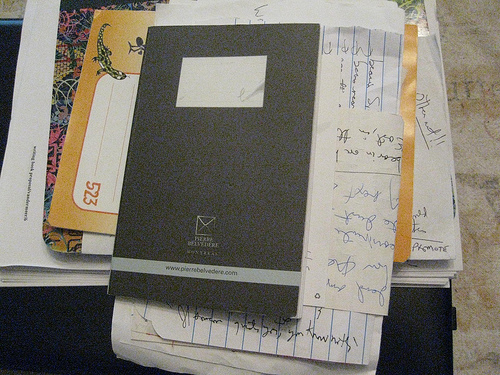
(Mormeck notes: brimming, overstuffed, ready to rock 'n' roll.)
It's been relatively silent here at VanderBlawg Central as I ramp up on projects after finally having seen the last of THE WEIRD and turned the SHARED WORLDS teen writing book over to the designer. Over at Cheeky Frawg, we're finalizing work on Amal El-Mohtar's The Honey Month (late Sept) and proofreading the ODD? anthology (Oct 1, with print release in December). We're also in the planning stages for several new anthologies and getting ready to dive into final edits on our BESTIARY anthology.
I've also gotten back into The Journals of Doctor Mormeck, and should be posting new entries starting tomorrow.
In other news, I'm also now working on my creative writing book for Abrams Image, the one with 150 full-color images being designed by John Coulthart (with much of the art also by him). Below you'll see part of the initial draft for the Beginnings chapter. I'm really excited about this one, and it's going really well. The hope is to create a visual language for teaching creative writing, in the context of fantastical fiction.
Also, we're having work done on a Cheeky Frawg website and beginning to organize the weirdfictionreview.com site, for launch in October. This in addition to making progress on the draft of my novel Borne and several other projects. Hard work, but largely fun, too.
That's what I'm up to. What are you up to?
What I Mean By Work; What Do You Mean? originally appeared on Ecstatic Days on September 15, 2011.




September 14, 2011
Liking Characters: Not Necessary
Good post here by T.N. Tobias about likeable/unlikeable characters. I commented there, with this:
I would add that HH is trying in writing to make himself seem likeable and that Nabokov further does the seemingly impossible in the novel by making Lolita a real person despite HH's distortion, which is an act of deep characterization. I don't need or entirely want likeable characters, nor do I need them to share my belief systems. I do not need them to be an echo chamber and I am suspicious of readers who do need this because I think such readers tend to misread books—sometimes very badly misreading books…Readers who place value judgments on writers based on their characters—generally a huge mistake—are also more likely to be the ones who require likeable characters as well.
Liking Characters: Not Necessary originally appeared on Ecstatic Days on September 14, 2011.




September 13, 2011
Books for Sale! Lambshead Cabinet, Steampunk Bible, and More!
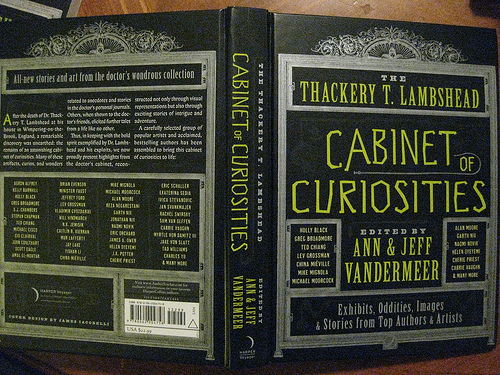
Want a signed copy of The Thackery T. Lambshead Cabinet of Curiosities or The Steampunk Bible? With the help of a bookseller we now have a limited number of the Bible available and slightly more of Lambshead. For the Bible, I'll throw in a drawing of an airship.
I also have the Murder by Death Soundtrack for my novel Finch, which I'll happily inscribe with secret gray cap meanderings. I still have some first edition trade paperbacks of the US edition of Finch.
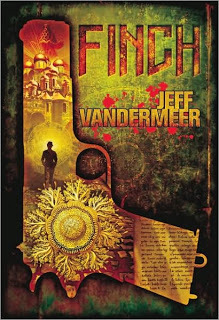
For United States readers only:
—$22 each for the Bible and Lambshead. Plus $5 shipping for one, $8 shipping if ordering both books.
–$14 for the US edition of Finch plus $4 shipping.
—$7 for the MBD soundtrack including shipping; only $5 if you order a book with it.
If you order one of all of these items, shipping is $10.
For larger orders, query at vanderworld@hotmail.com. Paypal to vanderworld@hotmail.com with address info and how you want them personalized. Checks also okay.
For foreign orders or for the complete list of our books for sale, including non-VanderMeer titles, query at vanderworld@hotmail.com. We're in the opening stages of a cull, as the books are beginning to overwhelm the house…
[image error]
Books for Sale! Lambshead Cabinet, Steampunk Bible, and More! originally appeared on Ecstatic Days on September 13, 2011.




Nnedi Okorafor Profile on Shared Worlds Site
Jeremy L.C. Jones has posted a longish profile of World Fantasy Award finalist Nnedi Okorafor on the Shared Worlds teen writing camp site—including some observations about her visit as the Amazon.com visiting writer this year. Go check it out.
In a few days we will announce our full line-up for 2012.
Nnedi Okorafor Profile on Shared Worlds Site originally appeared on Ecstatic Days on September 13, 2011.





